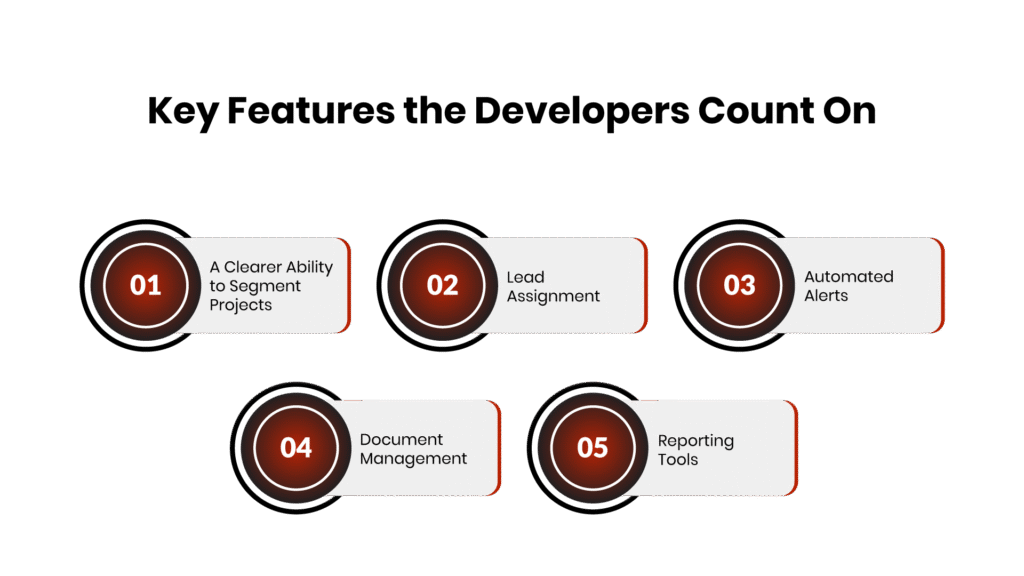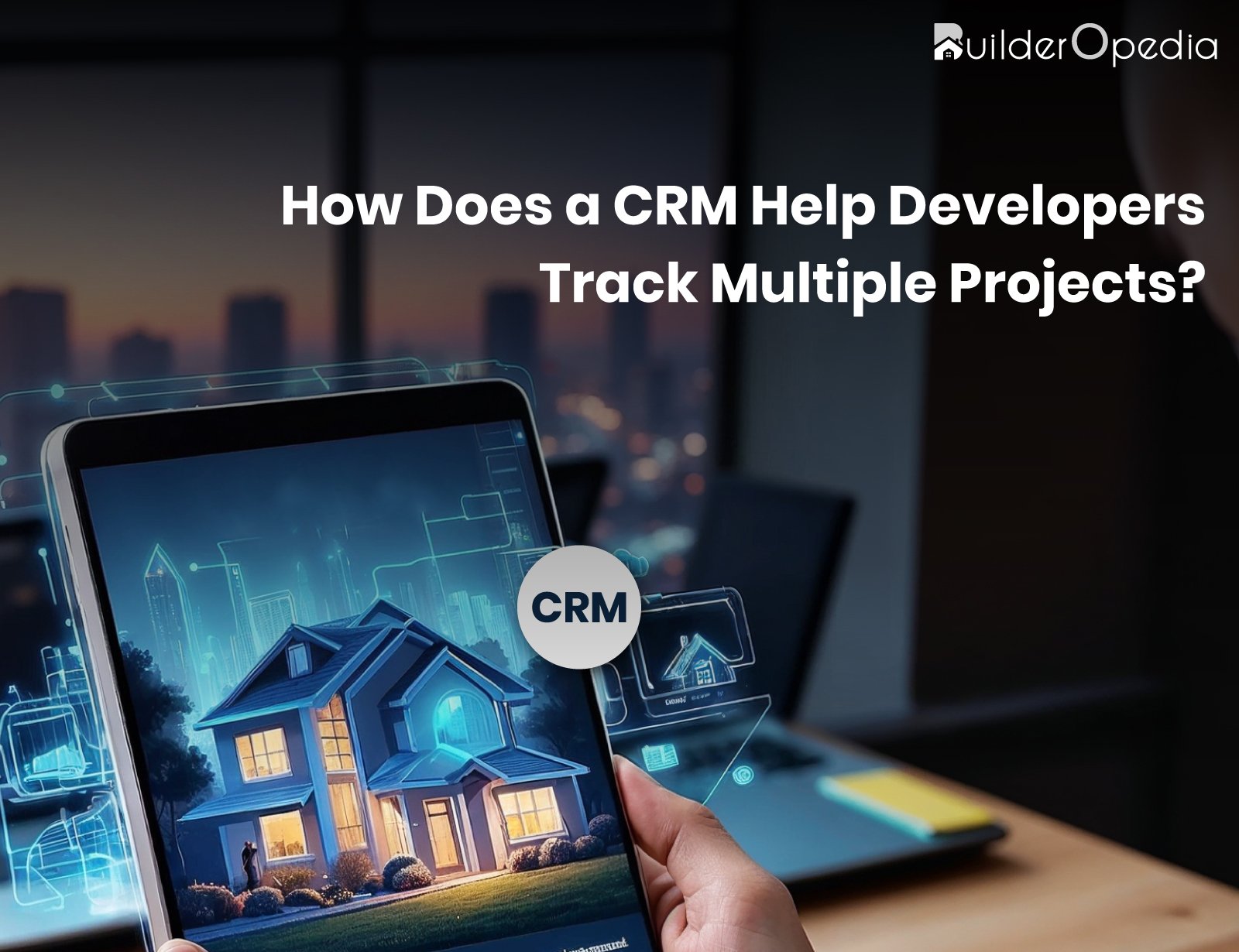As a developer, you’re managing multiple projects, all at once which is why a real estate CRM can provide enough structure to make it all manageable. You’re getting leads from all over, buyers are requesting updates, there are deadlines to be met, etc. Without some system in place, developers often find themselves overwhelmed with their workload and lose sight of important details.
With a CRM, developers are able to oversee every project from a singular view. They can manage the buyer easier, facilitate timely payment schedules, and ensure effective communication overall. The system allows developers to turn their complexity into control and create a better experience for both their team and the customer.
Managing Multiple Projects Is the Norm in Real Estate
Developers manage multiple projects at the same time, and a real estate CRM allows them to manage every detail efficiently. Developers have to manage differing construction timelines for each project, a mixture of other buyer expectations, digest countless milestone payments, and track the totality of each project, which adds its unique workload. Without a unified system, any number of expectations are lost as a result of being in different spaces while working on multiple project timelines.
The complexity further multiplies when inquiries are coming in from different channels and payments are happening across projects while units are selling at different times. Developers that rely on manual tracking are set up for errors, delays, and frustrated buyers. A structured approach to managing each project can ensure that they are visible, the sales pipeline is clear, and your relationships with buyers deepen.
How Real Estate CRM Helps to Manage Multiple Projects
Since real estate CRM consolidates all information into one system, it helps to manage projects more easily. Developers can manage their sales pipeline and payment schedule and manage client touchpoints without having to switch between multiple applications. This functionality allows the developer to make timely decisions and keep a project on schedule.
Additionally, while a CRM will create a boundary for each project, it still provides the developer with an overview of all projects at the same time. Developers can assign leads to the right person, follow up with interested buyers at the right time, and give continuous updates on project status. A CRM real estate can align the operations and customer engagement so that developers can manage multiple projects and feel better about their decisions.
Key Features the Developers Count On

When a CRM real estate gives developers tools specifically developed for multi-project management, developers can engage in a more efficient operation that is complicated in nature. They can manage buyers and timelines for each project and also guarantee that there are no loose ends. A strong CRM can turn disconnected work into a more seamless operation, allowing for greater growth.
1. A Clearer Ability to Segment Projects
Developers can manage each project as separate, yet still get a simultaneous view. This means improved clarity, reduced ambiguity, and help for teams to concentrate on the right work.
2. Lead Assignment
A Customer Relationship Management (CRM) system ensures that inquiries from potential buyers are routed to the appropriate sales team. Developers were happy in knowing that when every buyer inquired, they would receive a thoughtful, timely response, and this truly improves their conversions and trust!
3. Automated Alerts
The CRM automatically generates alerts and reminders for everything from follow-ups, payment timelines, and reminders to important project updates. Teams can take timely actions, ensuring that they do not miss anything important!
4. Document Management
Developers can have a single source for all contracts, agreements, and project files. If records are in one, easily accessible place, their time and missed opportunities will decline, and errors will lessen.
5. Reporting Tools
The CRM comes equipped with reporting tools; developers can quickly see real-time reports on payments, sales, or project performance. Developers have the ability to review the insightful reports and compare them to determine success factors to create methods of improvement for what they do, which makes for stronger decision-making.
How Does this Change the Game for Developers and Buyers?
Developers were more in control of their projects due to the CRM real estate correctly organizing their sales, payments, and buy interactions from their database. The developers reduce their time by removing double work, reduce errors with accurate data, and keep teams on the same page as they should be with the client and its project. Developers are able to manage multiple projects while putting quality first at pace, thanks to accurate and trustworthy data.
They provide meaningful and timely communications to buyers regarding unit availability, payment deadlines, construction timelines, and project updates. Consistent and timely communication builds trust, simplifying the overall process and experience.
When developers use the CRM properly, their buyers become more confident in their decision to invest with them and their projects.
Beyond Today: The Future of CRM in Real Estate
As CRM real estate advances with transformative technology and systems, developers have more room to grow. This includes potential integrations into CRM+AI for behavioral prediction, IoT for tracking property use and performance, and analytics for making better investment decisions. Now, project management can be more predictive while improving customer engagement and personalizing the purchasing journey.
As the real estate development market continues to expand and become more competitive, developers are not content to let CRM simply be their sales and customer service tracking tool. They are using CRM to add virtual property tours and then virtually engage prospective buyers; they are linking CRM with ERP, granting them full visibility of themselves, their customer, and the market; and they are helping new scales of operations enter new markets, leveraging information with no new friction. And for the record, the future will belong to developers who think of CRM as their foundational strategy, not as just another sales tool.
Conclusion
Developers are revolutionizing project management when real estate CRM connects every task, team, and customer on a single platform. They can move quickly, connect with buyers effectively, and create stronger growth opportunities in today’s crowded market. The experience eases complexity into something meaningful while generating new levels of trust throughout the journey.
Now is the time! If you want to manage multiple projects seamlessly while maintaining ongoing buyer experiences, find a way to integrate and adopt BuilderOpedia-real estate CRM. You can innovate and build trust with your customers while building smarter and more efficient operations.
FAQs
1. What is a real estate CRM, and why do developers need one?
A CRM real estate allows you to manage the sales processes, buyer interactions, payments, and project information in one. The developers need a CRM real estate to improve operational efficiencies, reduce errors, and improve buyers’ experiences.
2. How will a real estate CRM help developers manage multiple projects?
A CRM real estate will track every project separately while providing one view. The CRM will help manage leads, payments, and timelines and store it all together to assist with tracking multiple projects.
3. What features or functions do developers need to look for in a real estate CRM?
Developers want project segregation, plus lead assignment, alerts, document storage, and reporting. This will make running more efficient and will help keep projects progressing.
4. In what ways can a real estate CRM improve the experience of buyers?
By implementing a CRM real estate, developers can keep their buyers updated with reminders and clear and open communication. Accordingly, this develops trust and ultimately leads to a more convenient, reliable, and seamless experience.
5. What does the future look like for CRM real estate?
The future of CRM real estate consists of AI-powered insights, IoT capability to monitor properties, virtual tours, and advanced connections to ERP systems. These innovations will convert CRM from a management tool to a growth machine.
For more insights, updates, and expert tips, follow us on LinkedIn.

